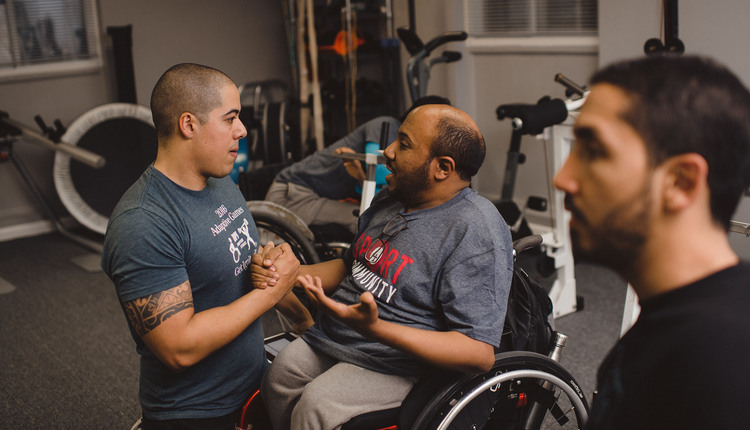
If each and every one of our clients immediately complied with our fitness programming, adhered to our sound nutritional and lifestyle advice and embraced the positive mindset that would set them up for success, our jobs may seem like they would be easier; but I think most of us would get very bored, very quickly.
As frustrating as it can be to work with a resistant or non-compliant client, it's often these clients who teach us the most about ourselves as and force us to step-up to be our best professional (and personal) selves.
The knee-jerk reaction is to focus on the character flaws of the client and what they need to change. But the more effective method to managing a non-compliant client is to rethink your approach and see if there is a different strategy to elicit progress rather than the approach that may be creating the resistance.
One of the most valuable investments in your personal and professional character is to become aware of and develop your emotional intelligence.* Emotional intelligence, in short, is your ability to empathize with others and then effectively communicate in a specific way with that person to achieve a specific outcome. In a very simplistic example of the way we intuitively use our emotional intelligence, you speak differently to a manager when you're asking for a raise than you do when you're out having drinks with friends. In fitness, you would train a high-level athlete very differently than you would train a stay-at-home mom. Emotional intelligence is your ability to apply different communication strategies with different people while still remaining authentically you. We need to understand how to put in practice various communication strategies with different types of clients to elicit the desired outcome of compliance.
For most of us who work with everyday clients, try to understand where the resistance may be coming from so it will allow you to adjust your approach in a more effective manner.
Consider where the resistance may come from, then use emotional intelligence to find the best way to communicate with your client to set them up for success. Here are some causes of resistance:
- We do fitness for a living; for our clients, it's a very small part of their life. A fitness program cannot be overwhelming and needs to be presented to them in a manner that is easy for them to integrate into their life.
- Every client has a story we may never know about that has a direct influence on the energy they devote to a program. Family issues, marital problems, financial trouble or job stress affect their willingness to comply and may make them more apt to resistance.
- Many clients are resistant because they were told they have to exercise or change their diet by a doctor or some other influence. No one is going to be vested until they experience the benefit for themselves. You can help facilitate that benefit.
- Resistance often comes from a lack of trust. You may be working with a client who has been burned so many times by failed weight loss programs that you are working against years of frustration and failure. Earn your client's trust through education and extra attention to detail. Keep an open mind when working with a resistant client; it usually is an opportunity to learn. They challenge us to grow as mentors and coaches and give us a platform to try new approaches. They also help us realize and accept that there may simply be certain people with whom we will never resonate. At the end of the day, most people just need to know you care; and when you tune-in to your emotional intelligence, you'll earn their trust and break down the barrier of resistance.
*For more information on emotional intelligence, I recommend the book Emotional Intelligence, 2.0 by Travis Bradberry.
As frustrating as it can be to work with a resistant or non-compliant client, it's often these clients who teach us the most about ourselves as and force us to step-up to be our best professional (and personal) selves.
The knee-jerk reaction is to focus on the character flaws of the client and what they need to change. But the more effective method to managing a non-compliant client is to rethink your approach and see if there is a different strategy to elicit progress rather than the approach that may be creating the resistance.
One of the most valuable investments in your personal and professional character is to become aware of and develop your emotional intelligence.* Emotional intelligence, in short, is your ability to empathize with others and then effectively communicate in a specific way with that person to achieve a specific outcome. In a very simplistic example of the way we intuitively use our emotional intelligence, you speak differently to a manager when you're asking for a raise than you do when you're out having drinks with friends. In fitness, you would train a high-level athlete very differently than you would train a stay-at-home mom. Emotional intelligence is your ability to apply different communication strategies with different people while still remaining authentically you. We need to understand how to put in practice various communication strategies with different types of clients to elicit the desired outcome of compliance.
For most of us who work with everyday clients, try to understand where the resistance may be coming from so it will allow you to adjust your approach in a more effective manner.
Consider where the resistance may come from, then use emotional intelligence to find the best way to communicate with your client to set them up for success. Here are some causes of resistance:
- We do fitness for a living; for our clients, it's a very small part of their life. A fitness program cannot be overwhelming and needs to be presented to them in a manner that is easy for them to integrate into their life.
- Every client has a story we may never know about that has a direct influence on the energy they devote to a program. Family issues, marital problems, financial trouble or job stress affect their willingness to comply and may make them more apt to resistance.
- Many clients are resistant because they were told they have to exercise or change their diet by a doctor or some other influence. No one is going to be vested until they experience the benefit for themselves. You can help facilitate that benefit.
- Resistance often comes from a lack of trust. You may be working with a client who has been burned so many times by failed weight loss programs that you are working against years of frustration and failure. Earn your client's trust through education and extra attention to detail. Keep an open mind when working with a resistant client; it usually is an opportunity to learn. They challenge us to grow as mentors and coaches and give us a platform to try new approaches. They also help us realize and accept that there may simply be certain people with whom we will never resonate. At the end of the day, most people just need to know you care; and when you tune-in to your emotional intelligence, you'll earn their trust and break down the barrier of resistance.
*For more information on emotional intelligence, I recommend the book Emotional Intelligence, 2.0 by Travis Bradberry.

















